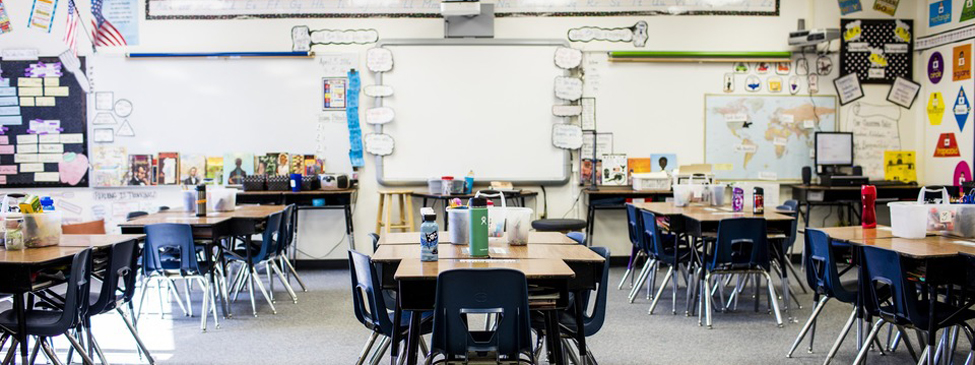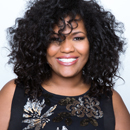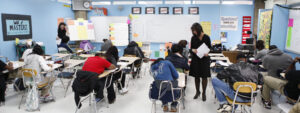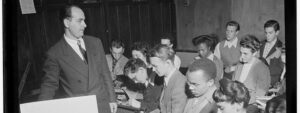After serving as Chancellor of D.C. Public Schools (DCPS) for five years, Kaya Henderson steps down today. Under her leadership, DCPS made dramatic improvements in enrollment, academic achievement, and graduation rates for students of color. Chancellor Henderson also led DCPS to reimagine its community engagement efforts and become a national model for districts looking to connect with the communities and families they serve. We sat with the Chancellor to talk about her vision for effective community engagement, and how she hopes DCPS can sustain it.
Why was it important for you to build real partnerships with families and communities during your tenure as Chancellor?
I only have kids eight hours a day, five days a week. But all the other things that happen in their lives affect what happens during my eight hours. I could act like that doesn’t matter—but it does. I think the only way to make my time with kids count is to engage families and communities as part of the solution. If families can reinforce and set expectations about what is supposed to be happening in schools and support the work of our teachers at home, if community organizations can fill in where I can't, then we all have a better chance at success. Why wouldn’t I do that?
I believe schools that only see themselves as academic institutions—and don't see themselves as partners with parents, non-profit organizations, or city agencies—severely compromise what they can accomplish. I say all the time, these are not my schools, these are our schools. We, the collective we, the system of D.C., have to decide what we want.
[subscribe]
Part of why I think we have been successful in building partnerships is because we set clear priorities and a clear vision for where we want DCPS to go. Families and communities understand it and feel part of the vision because our priorities come from them. When we started to put together our strategic plan in 2012 we asked parents, families, students, and community members, “What do you want to see in DCPS 10 years from now?” Through an online platform, postcards, and boxes in schools where folks could put their responses, we gathered 10,000 pieces of feedback. We built our strategic plan based on that feedback and, as a result, parents and communities can articulate that vision back to us because it comes from them and we have delivered on what they asked for.
Why do you think other districts sometimes struggle to build partnerships with families and communities?
You’ve got to believe your communities are valuable assets. A lot of people think our communities are broken and can't contribute to their kids’ education. A lot of folks don't respect our parents and families just because of their economic situation or their level of education. So first, it starts with a belief that every single parent loves their kid and wants them to be successful in school, no matter what their station in life. That is foundational.
Another issue is that we sometimes trick ourselves into thinking we must operate with such a sense of urgency that we don't have time and patience to do things that might be a little messier. I think there is a tendency to look at parents as employees. When you work with employees, you have more say over their actions. But when you're working with people who are not your employees, you can't guarantee a particular timeline, outcome, or even that they'll agree with you. That makes the work harder, and many districts cut their losses and say it's too hard.
What do you think is the key to DCPS’ parent engagement efforts?
It took us a while to figure out the best way to engage parents. I'm not knocking anybody else's approach, but we realized parents’ number one concern is how they can help their kid. So we let that be our parent engagement strategy. There are parents who can sit in classrooms during the day, run PTA meetings, and be engaged in policy decisions, but that's not all parents. All parents want to help their kid be successful. So how do we design strategies to do that? For us it means saying to parents, “We want you here, we want you helping your kids, and we're going to help you find ways to do that.”
One way we do that is through a parent cabinet I meet with monthly: 24 DCPS parents, three from each ward. Any major initiative the district undertakes is run by them first and we get their feedback. This always gets us to a better outcome than whatever we were planning. Also, to listen to parents and community members all over the city, I put in place a community action team whose entire job is to go to every civic association meeting, neighborhood, and community meeting in all wards. They hear people’s concerns, put together a report every day, and let us know what people are saying on the street.
My belief that parents are partners comes from me trying to be a good parent myself and realizing I needed help from a school district to do so. I’m engaged in education. I’ve got a couple of degrees, right? Still, there are many things I struggle to understand. Like the report cards my first grader used to get—I didn't know how to read them. That led me to pull together a task force to figure out how to redo report cards. I demanded parents be on the task force because allowing central office people who are not the receivers of report cards to determine what they look like didn't seem right. As a result, our parents helped us create a much better report card.
How have you engaged students in your decision making processes?
We want to make sure our kids are satisfied. One of our big goals is getting 90 percent of kids to report they love their school. We're at 83 percent right now. But beyond that, we talk to them. We ask them: What do you like? What don't you like? When they tell us, I hate the food, or my building is dirty, that gives me actionable items.
I'm required to do public budget hearings, and sometimes kids come to them. But what I decided to do a few years ago was begin holding student budget hearings beforehand and asking each high school to send two kids. The two students from each school present a platform as to what they want to see in the budget. That first year they talked about being bored with just four core subjects and not having enough electives, extra-curricular activities, or AP courses. As a result, I put 12 million dollars into 20 electives at every high school and moved our requirement from four AP classes offered per year up to eight.
At DCPS, departments that don't traditionally think about community engagement now see it as a part of their work. Can you talk about why that is important?
I'll be honest, doing that came from a place of frustration. I'm out in the community because that's my job. I'm hearing from parents who are frustrated and I'm coming back to my management team and saying we've got to change this or that. Some leaders who weren't out in the community were saying, “I don't think that's the real problem.” But if you have a mother screaming at you about an issue, you know it is something you have to handle.
A couple years ago I mandated every single cabinet member attend a certain number of community meetings each year. I also mandated every member find some way in their work to engage parents. For a lot of them it was difficult and uncomfortable. But now, each of my chiefs gets that their work is better because they get feedback from the people we serve. They read the community action team’s daily updates. It's the most read document around DCPS. What started from a place of frustration is now just the way we do business.
[related]
Reflecting on the legacy you’re leaving behind at DCPS, what do you see as the next step for the district?
I just want it to keep getting better. I think we have defied expectations. We have done the impossible. We are a school district that was pronounced dead a long time ago. Nobody ever thought we could get better. Nobody thought we could productively engage parents. Nobody thought we could raise graduation rates or bring more kids back to the district.
When I started in 2007, I knew I wanted to win, I knew I wanted to do better for kids, but I didn't have a clear idea of all we could accomplish. I don't know 10 years from now where I want DCPS to be, but I want them to keep defying expectations. I want them to keep listening to the community to chart the path for where we need to go. Where we need to go is not a fixed place. We live in a city that is changing every single day and I want them to be responsive to that change.





